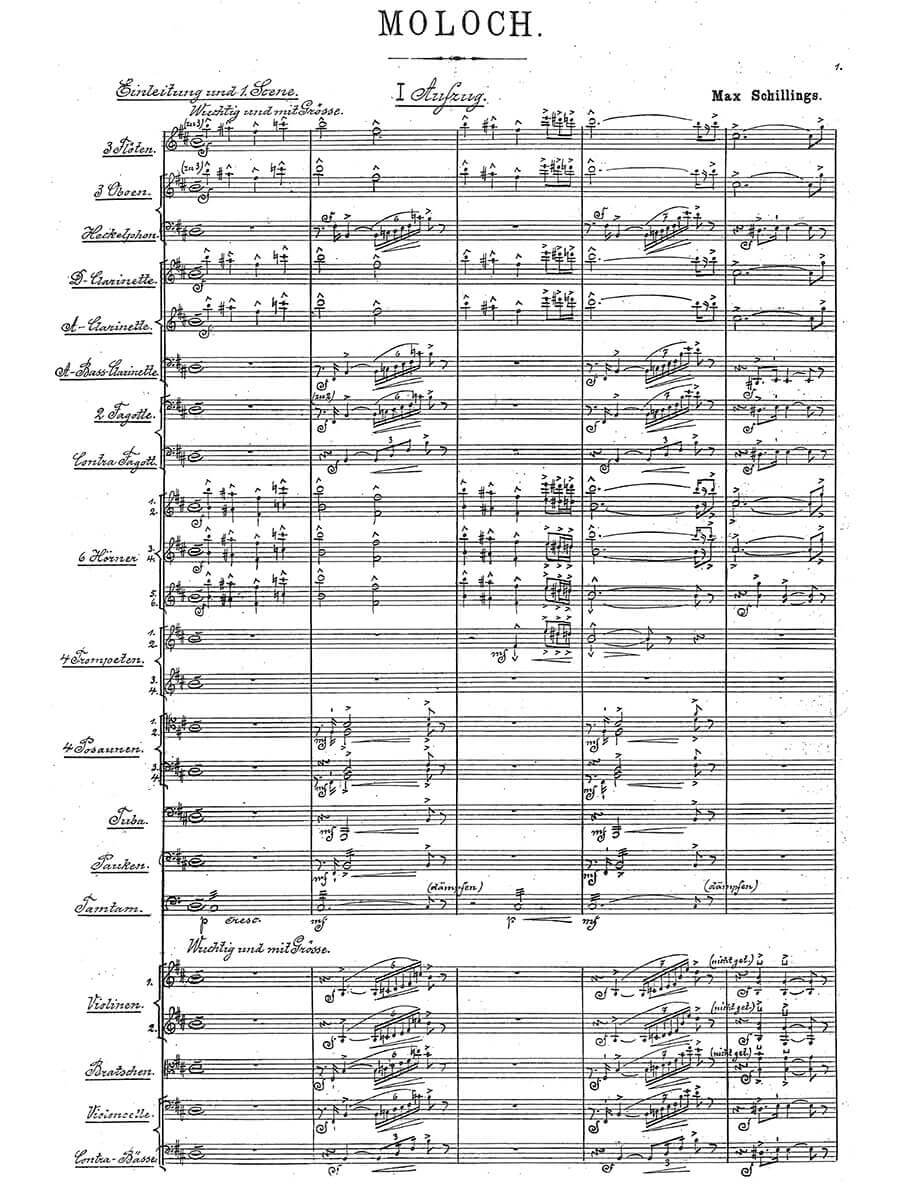Moloch op.20 (in two volumes with German libretto)
Schillings, Max von
79,00 €
Preface
Max von Schillings
(b. Düren, 19 April 1868 ‑ d. Berlin, 24 July1933Moloch op. 20
Preface
The gift of the manuscript of Max von Schillings’ 1906 opera Der Moloch to Adolf Hitler by Schillings’ widow has placed an unjustified emphasis on the composer’s over-close proximity to National Socialism. Although Schillings died in 1933, the comprehensive assimilation of his work into the culture of the Third Reich has resulted, up to the present day, in an underlying assessment of his attitude to Nazism as, at best, not a neutral one. It is not least through this judgement (and also through the lack of a critical biography) that an unprejudiced appreciation of his work is still difficult to achieve.As a composer of opera, Schillings should not be underestimated. His last stage-work, Mona Lisa, is an important representative of the symbolist aesthetic in opera (as also, for example Korngold’s Die tote Stadt), and was considered entirely successful until long after the Second World War. Already, with his first work, Ingwelde op. 2 (1893), he had enjoyed a notable triumph with those accustomed to the Bayreuth Wagnerian style. This work was followed in 1899 by the light-hearted opera Der Pfeifertag. It was therefore appropriate that, from 1908 to 1918, Schillings should occupy the role of Musical Director of the Royal Court Theatre in Stuttgart, where Richard Strauss’ Ariadne auf Naxos and Alexander von Zemlinskys Eine florentinische Tragödie and other works were premièred. After the First World War, Schillings alternated as the successor to Richard Strauss in Berlin and, among other activities, as Director General of the Berlin Staatsoper until 1925.
The original performance of Moloch at the Dresden Court Theatre on the 8th of December 1906, under the direction of Ernst von Schuch, was, generally, only a moderate success, (Richard Strauss complained that only ideas not people were on the stage and the opera should be Schillings’ lifelong, theatrical Child of Woe). Even Gustav Mahler’s commitment to the work at the Vienna Court Theatre did not augment its success. This was followed briefly in 1934 by a poor, distorted and Nazified1 performance, which retained little more than a remnant of the original concept, or of Friedrich Emil Gerhäuser’s (1868–1917) libretto after the uncompleted work of Friedrich Hebbel. The drama and the opera thematise the danger of blind belief in Moloch, who, according to context, is identified as Healer and Monster of Iron but finally, and above all, as Bringer of Death. Moloch was, for Hebbel, a relentless and ultimately unsuccessful struggle (the first two acts of Hebbel’s drama are complete, the third almost finished and the remainder exists only as fragments); the first critical edition of the work in 1908 was only one of many which initiated artistic engagement with the subject. At a time of increasing industrialisation, the idea of Moloch (not infrequently compared with the metropolis as devourer of the individual) exerted an undoubted fascination on the Fin de Siècle.
However problematic the drama and the libretto may be in today’s climate, the music itself is compelling and impressive, even when, as in the 1989 Oberhausen performance, it was subject to a fundamentally distracting scenic interpretation. In 1909, Rudolf Louis was fulsome in his praise of the music, writing: ‘in Moloch, Schillings has attempted to attain the summit of what has already been achieved, as if he has felt the need for a rest and a review of the road already travelled, before he sets off on more journeys and further explorations.’ (Die deutsche Musik der Gegenwart um die Jahrhundertwende.) In times when unusual subjects for opera have a difficult time, as yet only the Harvest Feast from Moloch (the Introduction to Act 3) is available in recording, despite the infinite beauty of the full score.
Translation: Rose Simpson
1 ‘gleichgeschaltet’ – interpreted according to a clearly defined National Socialist world-view.
Performance material is available from Boosey & Hawkes (www.boosey.com), Berlin
Score Data
| Edition | Opera Explorer |
|---|---|
| Genre | Opera |
| Size | 225 x 320 mm |
| Printing | Reprint |
| Pages | 592 |
